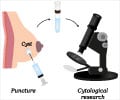Telephone follow-up after breast cancer treatment is more acceptable to patients than traditional hospital follow-up.
Telephone follow-up after breast cancer treatment is more acceptable to patients than traditional hospital follow-up, finds a study published on bmj.com. It may also help to reduce the burden on busy hospital clinics.
Clinical examination, consultation and routine breast screening (mammography) are the norm in breast cancer follow-up although UK national guidelines currently recommend that intensive follow-up to detect metastatic disease is not beneficial.Professor of Nursing, Kinta Beaver and colleagues identified 374 women treated for breast cancer at two NHS hospitals in the North West of England who were at low to moderate risk of recurrence.
Participants were randomly split into two groups. One received traditional hospital follow-up (ten minute consultations and breast examination by doctors at hospital clinics) while the other received telephone follow-up (20 minute consultations with no clinical examination by trained specialist nurses). Both groups received mammograms as per hospital policy.
The researchers found that the telephone group were no more anxious as a result of foregoing clinical examinations and face-to-face consultations, and reported higher levels of satisfaction than those attending hospital clinics. The number of clinical investigations ordered did not differ between groups and there were no differences between groups for time taken to detect recurrent disease.
The results of this study show the positive benefits of telephone follow-up by specialist breast care nurses, say the authors. The service was well received, especially by patients with long travelling distances or mobility problems, with no evidence of physical or psychological detriment.
They suggest that telephone follow-up may have a broader applicability to other patient groups in the cancer field and beyond, while also reducing the burden on busy hospital clinics.
Advertisement
However, it does not bring us closer to definitive proof that routine clinical breast examination is unnecessary. He believes that, only with such evidence will we see widespread implementation of novel alternatives, to the benefit of our patients. This, he says, would require a big trial, but it must happen.
Advertisement
SRM















